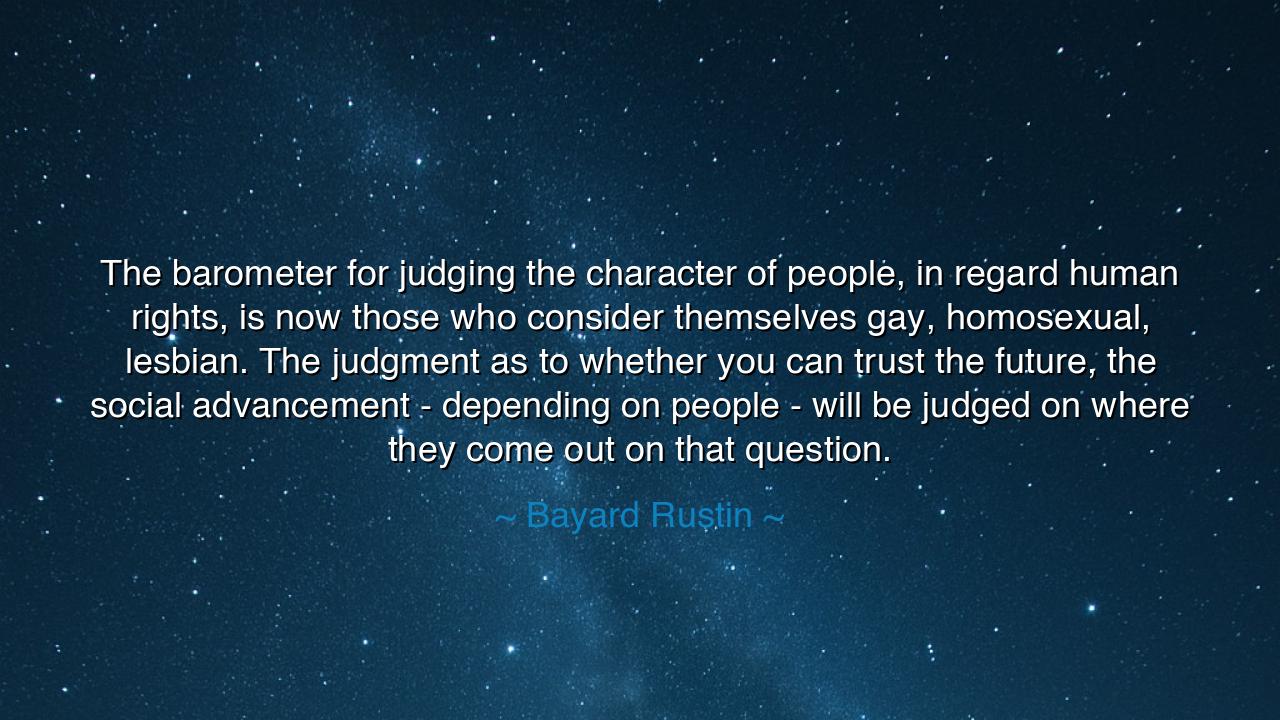
The barometer for judging the character of people, in regard
The barometer for judging the character of people, in regard human rights, is now those who consider themselves gay, homosexual, lesbian. The judgment as to whether you can trust the future, the social advancement - depending on people - will be judged on where they come out on that question.






“The barometer for judging the character of people, in regard to human rights, is now those who consider themselves gay, homosexual, lesbian. The judgment as to whether you can trust the future, the social advancement—depending on people—will be judged on where they come out on that question.” – Bayard Rustin
Listen well, O seeker of justice, for these words come from a man who knew both the weight of struggle and the fire of truth. When Bayard Rustin, the strategist and spirit behind the civil rights movement, spoke these words, he was not merely addressing his own age—he was calling across generations. His voice was that of a prophet who had seen the heart of humanity tested by the measure of compassion. He declared that the true barometer of character—the instrument by which we gauge the soul of a people—lies in how they treat the marginalized, the misunderstood, and the maligned. For to stand with the oppressed is to stand with truth itself.
In his time, Rustin was both a champion and an outcast. As a key advisor to Dr. Martin Luther King Jr., he helped craft the dream of freedom that thundered through the 1963 March on Washington. Yet because he was a gay man, he faced suspicion and scorn, not only from his enemies but sometimes from his own allies. Still, he did not retreat into silence. Instead, he rose with quiet dignity and spoke this timeless truth: the test of progress is not how we treat the powerful, but how we honor the dignity of those most vulnerable. Thus, Rustin became both architect and oracle—teaching that the fight for one group’s freedom is inseparable from the freedom of all.
In saying that “the barometer for judging character” lies in how society regards its gay, lesbian, and queer citizens, Rustin redefined morality itself. He saw that every age has its chosen scapegoats—those upon whom fear and ignorance are cast like stones. In his era, as before, the world cloaked cruelty in the name of virtue, claiming righteousness while denying humanity. But Rustin, with the vision of a sage, warned that the future could not be trusted to those who failed this test. For a civilization that devalues one group of people will, in time, devour itself. The measure of human rights is not in the words we speak of liberty, but in the lives we are willing to protect.
Consider the story of Harvey Milk, the first openly gay elected official in California, who, years after Rustin’s struggle, carried the torch of that same truth. Milk knew the cost of visibility, yet he also knew the power of hope. He stood in the public square and said, “You gotta give them hope,” not for himself, but for all who felt unseen. Like Rustin, he faced hatred, and like Rustin, he fell—but in his fall, he lifted others higher. Their courage became the seed of change, proving Rustin’s prophecy true: that the destiny of a society depends upon how it treats those who dare to live authentically.
The ancients would have called such wisdom sacred. They taught that a kingdom is not judged by the splendor of its walls, but by the justice of its heart. So too does Rustin teach us that the future—that vast and shining horizon—will belong only to those who extend their humanity beyond the narrow boundaries of comfort. The social advancement he speaks of is not merely technological or political; it is spiritual. It is the evolution of empathy—the awakening of a collective conscience that sees divinity in every face, regardless of love or identity.
O listener, take this teaching to heart: to defend the dignity of others is to defend your own. When you witness injustice, do not remain a spectator; become a participant in compassion. When you hear prejudice spoken, confront it not with hatred, but with truth. The barometer of your character will not be measured by your words, but by your courage. Ask yourself, as Rustin asked of all humanity: Where do I stand when others are made to suffer? For how you answer will determine the world you leave behind.
Thus, let the lesson of Bayard Rustin echo in every soul that seeks to live nobly: the measure of our civilization lies in how we embrace those who are different. The path of justice is not paved by comfort, but by conviction. Stand firm beside the outcast, for in doing so you stand beside truth itself. And when the future looks back upon us, let it be said that we passed Rustin’s test—that we were the generation that chose understanding over ignorance, courage over silence, and love over fear.






AAdministratorAdministrator
Welcome, honored guests. Please leave a comment, we will respond soon